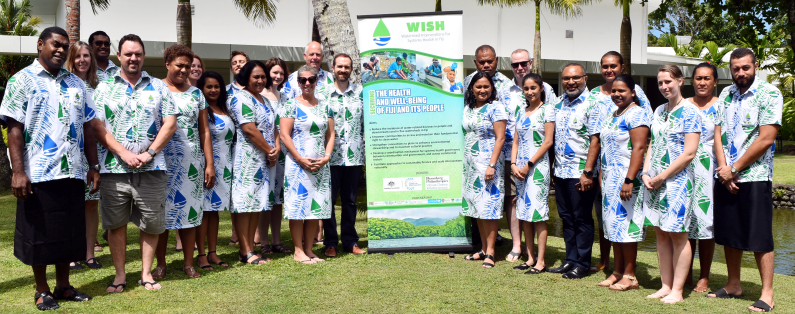Baseline data helping to identify priority issues in five sub-catchments in Fiji
Outbreaks of waterborne diseases such as dengue fever, typhoid and leptospirosis are common in Fiji. Since 2005, there has been at least 20 reported cases of typhoid, a 27,000 case dengue outbreak between 2013 to 2014 and a three-fold increase in leptospirosis cases since Tropical Cyclone Winston in 2016.
The Watershed Interventions for System Health in Fiji (WISH Fiji) project is helping to better understand drivers of these diseases within Fiji’s watersheds, and working with local communities and government to reduce disease risk, which will also have co-benefits for downstream water quality and coral health. Watersheds are defined by the area or ridge of land that separates waters flowing to different rivers, basins, or seas.
In February, WISH Fiji project staff and partners met for a four-day mid-term review workshop. The objective of the workshop was to reflect on the achievements so far and plan the next phases of the project.

The participants shared and discussed results from the project’s baseline survey from the five target sub-catchments.
Results of the baseline survey from the project’s five target watersheds suggested a number of areas for attention to reduce incidences of waterborne diseases. These disease risks will be shared with communities, provincial offices and relevant government partners in the upcoming months.
At the watershed scale, the project identified risk factors driven by development activities which affect the ability of forests, streams and wetlands to provide natural flood control and water purification functions.
At the community scale, water and sanitation infrastructure and management of livestock, agriculture and pests may be contributing to increased incidences of the water-related diseases.
Interviews with over 300 households further identified habits or behaviours that increase the risk of disease.
Following four days of intensive brainstorming and sharing of information, the results were shared with key government officials and the representatives from the provincial offices. What came out strongly was the need to collaborate more closely to ensure interventions will be effective, and to share limited resources.
While closing the workshop, the Minister for Health and Medical Services, Dr. Iferemi Waqainabete, said that the Ministry has long been concerned about the numbers of typhoid, leptospirosis and dengue cases.
He added that the Ministry worked hard with the communities last year to enact preventative measures which focused on hygiene and sanitation to help reduce these disease outbreaks.
Dr. Waqainabete stated “WISH Fiji is the first project in our country to embrace an integrated, preventative approach to tackle Fiji’s three plagues – leptospirosis, typhoid and dengue – through actions that will simultaneously bring benefits to the environment and the people of Fiji.”

